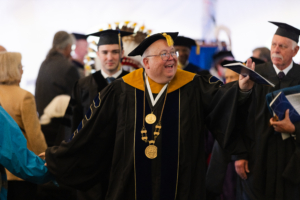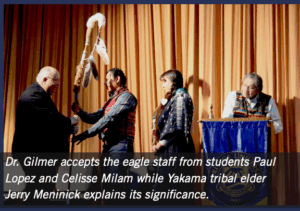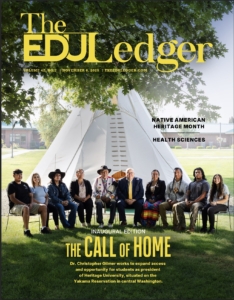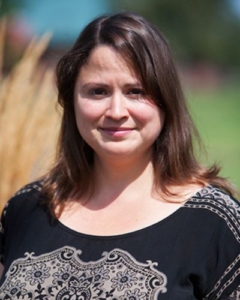Guided by Family, Grounded in Tradition, Growing Toward the Future – Wings Fall 2025

Heritage University President Dr. Chris Gilmer
Guided by Family, Grounded in Tradition, Growing Toward the Future
Heritage University entered a new era of leadership this fall with the inauguration of its fourth president, Dr. Chris Gilmer. The multi-day celebration, built around the theme of family, honored the university’s roots with the Yakama Nation, reflected on its 43- year history, and set a hopeful vision for the future of access and opportunity in higher education.
HONORING TRADITION
The celebration began with a cultural exchange hosted by the Yakama Nation, a meaningful acknowledgment of Heritage’s founding on the Yakama homelands and its ongoing partnership with the Tribe. Guests experienced a presentation on the Treaty of 1855, traditional drumming and dancing, and the symbolic transfer of Heritage’s Eagle Staff to Gilmer by students Paul Lopez and Celisse Milam. Yakama Nation Tribal Council Chairman Gerry Lewis formally welcomed the president, underscoring the shared commitment to education and sovereignty. The gathering concluded with a traditional salmon lunch, filled with honor songs and messages of goodwill.
THE INSTALLATION CEREMONY
On Friday, Heritage faculty, staff, students, alumni, and community members gathered on the Toppenish campus for the formal installation ceremony. Distinguished voices extended greetings, including Washington State Governor Bob Ferguson, Lewis, State Senator Curtis King of the 14th District, and State Senator Nikki Torres of the 15th District. The Heritage community was also well represented. Mercedes Garcia, president of the Student Government Association, spoke on behalf of students. Dr. Amy Nusbaum, president of the Faculty Senate, shared words on behalf of the faculty. Adriana Villafán, president of the Staff Educator Senate, offered reflections from staff, while alumna Betty Sampson, Class of 1992, spoke for Heritage graduates. Representing the Board of Directors, Dr. Kathleen Hilton, SNJM, added her greetings, underscoring the continuity of Heritage’s mission.
The ceremony wove together tradition and artistry. Heritage Senior Freddie Garza opened with a stirring rendition of the National Anthem. Later, National Book Award-winning poet Aaron Abeyta gave a powerful reading of his poem, The Moment of Liberation: When Your Dungeon Shook. The Wapato High School choir En Vox lifted their voices in “True Colors,” celebrating unity and authenticity.
The investiture itself, led by Board Chair Bob Gerst, officially conferred the responsibilities of the presidency to Gilmer. The moment was highlighted by a performance of “One Moment in Time” by soprano Ann McPhail, capturing the spirit of the occasion.
In his inaugural address, Gilmer shared his personal journey from rural Mississippi to higher education leadership, reflecting on the transformative power of opportunity. He emphasized Heritage’s mission of access, inclusivity, and service to first-generation students. “We are here to open doors,” he said, “and together we will build bridges for generations to come.” The program closed with blessings from Tougaloo College President Dr. Donzell Lee and a rousing performance of the Heritage alma mater “Lift High the Banner!” by En Vox. A southern-inspired reception in the campus café offered guests a chance to celebrate with the new president.
A GALA TO CONCLUDE THE CELEBRATION
The week concluded with a formal gala at Yakima’s Crown Ballroom. The evening combined elegance with heartfelt fellowship, featuring opera selections performed by McPhail and a southern-inspired menu honoring Gilmer’s roots.
CONTINUING THE CELEBRATION The inauguration events in the Yakima Valley are only the beginning. In the months ahead, Heritage University will continue celebrating Gilmer’s leadership with community gatherings in the Tri-Cities and through partnerships with educational organizations across the region. ![]()
To watch clips from the Installation ceremony, please visit https://heritage.edu/inauguration/.






 Heritage University has completed a major renovation of the Kathleen Ross, SNJM Center, transforming it into a cutting-edge learning space anchored by the new Adelante STEM Center. The $2.5 million project, which broke ground in December 2024, was made possible through a $1.5 million Adelante STEM grant from the U.S. Department of Education and a generous $1 million private donation.
Heritage University has completed a major renovation of the Kathleen Ross, SNJM Center, transforming it into a cutting-edge learning space anchored by the new Adelante STEM Center. The $2.5 million project, which broke ground in December 2024, was made possible through a $1.5 million Adelante STEM grant from the U.S. Department of Education and a generous $1 million private donation.






 When she arrived in the Yakima Valley at age 20, Batarao found community in Yakima’s Wapato Filipino American Youth Group, which like a home away from home.
When she arrived in the Yakima Valley at age 20, Batarao found community in Yakima’s Wapato Filipino American Youth Group, which like a home away from home.